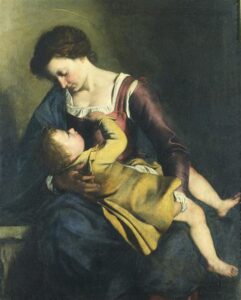God Is With Us
Sophia always loved Christmas. As a child, she had loved the joy and excitement, the thrilling expectation written into it all, but she also loved the mystery woven into the story, the sense that a great drama was being played out for us to understand, one with deep symbolic significance. As an adult and as a scholar, the significance was even more real to her. It is for this reason that she asked for a passage from St Athanasius’ On the Incarnation (one of the intellectual jewels of Late Antiquity) to be read at her funeral—where it was, ably and beautifully, by her thesis supervisor, Professor Paul McKechnie.
The concept of the Incarnation, the notion that in the body of Christ the eternal enters into the world, is the deepest mystery of the birth of Jesus. In Christ, the Logos—the fundamental structure and order of all Being—is written into DNA (and, as it turns out, DNA really is a language). As John’s Gospel states, the Word becomes flesh.
It is hard for us to appreciate just how potent this idea is, how far reaching in its consequences, how extraordinary it is in its reconfiguring of the universe. All of human history was overwritten by it. It changed fundamentally the nature of discourse, of political and social structures, of all human relations, because it forced us to reconceptualise our relationship with the Divine.
In the pagan belief system of the ancient world, gods were objects of worship to be placated and propitiated through ritual and observance. It was a sacrificial system—in some places involving actual human sacrifice, in others using animals, agricultural products or other things of value. The relationship of man to the divine was very much pyramidal and power-based. It was a relationship without mutuality, unidirectional in its power dynamics. In Greek mythology, for example, the gods were described as regularly interfering in human life (favouring one hero or city over another, as in The Iliad), but always from a position of power—taking sides, as if the universe were a kind of cosmic football game. Gods were said to appear in human form as a disguise (as Athena did multiple times in The Odyssey) so as to influence events in the human world, but the distance between the realm of “the Immortals” and humankind was maintained. As Gloucester says tragically in the equally pagan world of Shakespeare’s King Lear: “As flies to wanton boys are we to the gods; / They kill us for their sport.”
But in the Christmas story—in the Christian story—we have written into history (and the life of Christ actually has been written into history, not just by commentators in the ancient world such as Tacitus, but by the two millennia of subsequent events which have unfolded from it) an entirely different understanding of the relationship of the Divine and humanity.
The Old Testament book of Isaiah relates an ancient prophecy:
Therefore the Lord himself shall give you a sign;
Behold, a virgin shall conceive, and bear a son, and shall call his name Immanuel.
Immanuel, which is to say, “God is with us.”
Not above us, not over us, but with us, with us in all the pain and suffering—and yet also in all the beauty—of human life. It is no accident that the theme of the Madonna and Child has been such a glorious one in Christian art. In the intimacy—and the sheer loveliness—of the image of Mary and the Christ Child is channelled a world-changing revelation: of humanity loving wholly a perfectly loving God.
Every Christmas is a restatement of this wonderful truth.
Wishing heartfelt blessings to all at Christmastide…

Madonna col Bambino: Orazio Gentileschi

Bella
Isn’t that Gentileschi lovely…
Thankyou Robyn. Xxxxxx. Soph would approve of the links with mythology.
Yes, she’d definitely give extra marks for that!